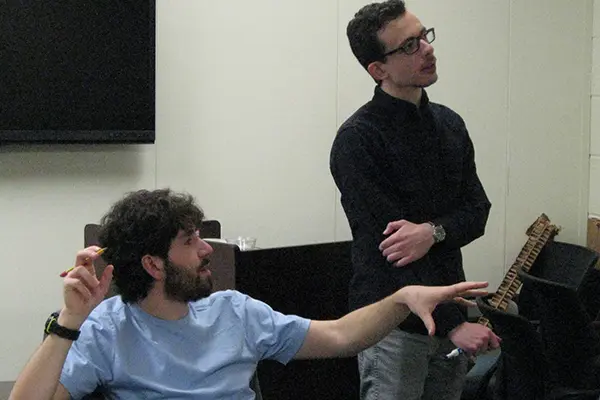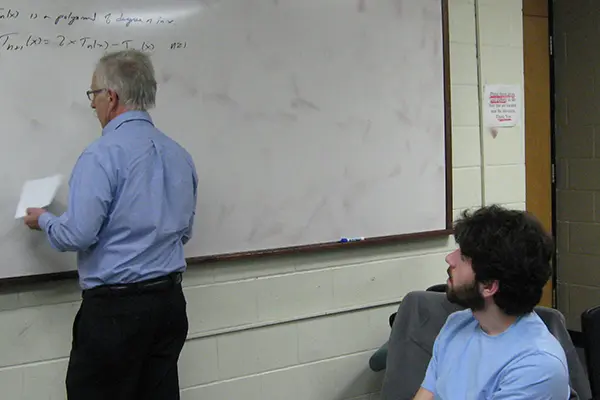Students Plan Careers in Analytics, Computer Science and Teaching
 Image by Katharine Webster
Image by Katharine Webster
11/15/2016
By Katharine Webster
If two players start with a pile of 13 stones and take turns removing one, two or three, how can a player make sure she wins by taking the last stone?
How to win at the game of Nim was by far the simplest question that students tackled in a recent session of Prof. Kenneth Levasseur’s honors course in Mathematical Problem Solving. (Answer: Take whatever number of stones leaves a multiple of four in the pile.)
Matthew D’Angelo, an honors math major from Newburyport who is pursuing a career as a math teacher through the UTeach program, says the class is very challenging, but also a lot of fun.
‘I didn’t realize how useful it was to learn how to solve problems.’ -Honors Math major Matthew D’Angelo
“It’s an excellent course,” he says. “I didn’t realize how useful it was to learn how to solve problems, instead of just learning formulas and answers.”
Levasseur’s students are among the growing number of students majoring in math on campus and around the country.
What’s driving that growth? The age of big data and the ever-expanding storehouses of electronic information related to health care, financial services and digital transactions are driving increasing demand — and guaranteeing high salaries — for skilled data analysts, statisticians, economists and finance professionals. In fact, jobs for mathematicians are projected to grow 21 percent from 2014 to 2024, much faster than the average for all occupations, according to the Bureau of Labor Statistics.
Those career possibilities and the sheer pleasure of studying math attracted sophomore honors student Caroline Read.
Read, who studied engineering in high school in Franklin, came to campus as an undeclared engineering major. She didn’t love her engineering classes, but she did love Honors Calculus II with Prof. Vidhu Prasad, although it was the hardest course she’d ever taken.
“I like how math makes you think. I started making connections, and not just to math. My understanding of physics is getting better, and so is my understanding of computer-aided design,” she says.
 Image by Katharine Webster
Image by Katharine Webster
Levasseur says the number of undergraduate math majors has increased 50 percent since 2010, from 130 to 196 students. That’s partly due to the overall growth in undergraduate enrollment, but it also reflects the rosy job outlook for graduates, especially in applied math, he says. The department has seen steady demand for statistics and other courses that provide the foundation for data analytics and has added a course in R, a software environment for statistical computing that’s commonly used in big data.
“Pure” math is popular, too. Levasseur’s honors class, now in its third year, is designed to turn students from learners into problem-solvers and prepare them for graduate school. It culminates with all the students entering the William Lowell Putnam Mathematical Competition, the most prestigious and difficult undergraduate math contest in North America, in early December.
Students get six hours to solve 12 problems worth 10 points each; the median score is usually zero or one. In addition to the individual competitors, three students will make up a team representing the university. This year, that team will include D’Angelo and Kenneth Allen, another honors math major.
Allen’s father, who graduated from UMass Lowell with a doctorate in math education, instilled a love of math in him. Now, the younger Allen is aiming for a career as an academic. He’s been a student tutor the past three years, a job he enjoys, and he loves thinking about pure math problems.
“Math is fun in and of itself, regardless of whether it has real-world applications,” he says. “It has inherent value, like art.”
Allen, who took Levasseur’s class as a sophomore, will be competing in the Putnam Competition for the third time. He has scored higher on the competition than any other UMass Lowell student.
Last year, he ranked 504th among 4,275 individual competitors from the United States and Canada, while UMass Lowell’s team finished 78th among 447 university teams. This year, Allen hopes to make it into the top 500, which will boost his chances of getting into a top graduate school.
“It feels really good to solve hard problems you’ve been working on for a long time, like the Putnam problems,” he says.




